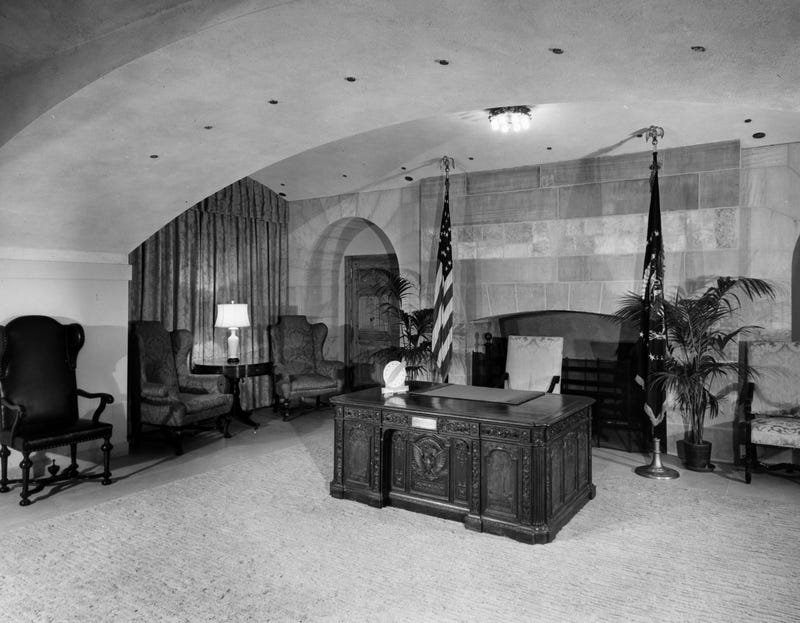The Resolute desk in the Broadcast Room in 1952, photo by Abbie Rose, from the Harry S. Truman Library & Museum
I am on record as believing that increasing the vaccination rate to very high levels is the only way to reduce unnecessary illness and death now that the virus has become endemic, and that employer mandates are the best stick with which to beat the unvaccinated off the dime. (I also think we should be using carrots of various kinds to make the vaccine cheaper than free.)
So I should be thrilled by President Biden’s speech, right?
Well . . .
On the one hand, yes, I am pleased to see that Biden is getting more aggressive about imposing mandates where he clearly has the authority to do so. That includes the federal workforce and contractors with the federal government, as well as the health care system that relies substantially on federal reimbursement through Medicare and Medicaid. The evidence from the mandate on active duty military personnel imposed since the FDA gave full approval to the Pfizer vaccine shows just how quickly mandates can work when their authority is clear, so where it is clear I certainly think it is time to use it.
But in a bunch of other areas, it’s just not clear that the president has the authority he plans to use. I think there’s a strong case to be made that he does, but that case is definitely going to be challenged, by public sector unions, by dissenting businesses, by Republican governors, etc. Nor is the case against—that vaccination mandates are properly a state government responsibility—that much of a stretch; in fact, it’s where much of the relevant precedent lies. There hasn’t even been any specific enabling legislation passed by Congress. Meanwhile, promulgating OSHA rules will take time and, as anyone familiar with the limited progress made on improved ventilation knows, those rules won’t enforce themselves. Even if the federal mandates ultimately pass muster, they probably aren’t going to move fast enough to prevent unnecessary death.
So why impose them? Many Republicans are going to argue that it’s a pure power grab, but I think that’s almost completely backwards. What I suspect they’re doing first and foremost is providing cover to other entities that want to impose mandates of their own, but have been reluctant to date to do so. In other words: they reflect the fact that authority has already been ceded long ago.
I’ve been genuinely surprised by how slow corporate America and Democratic-controlled states have been to impose vaccine mandates. With consumer confidence ebbing, return-to-the-office dates being pushed back, and other ways the delta variant is disrupting businesses plans, I expected to see a big wave of mandates that so far haven’t materialized. I wonder if the White House was similarly surprised, and that what they are hearing is that everyone else, from California legislators to New York bank CEOs, is looking for the president to lay down a marker so that they can follow rather than having to lead.
Biden’s moves may well set precedent, but he didn’t go far enough for some. He did not call for mandated vaccination to travel by air, for example, an omission for which he has been criticized. But this is emphatically an area where airlines can fully well move forward on their own, and yet haven’t—indeed, the airlines aren’t even mandating their employees be vaccinated, but are instead doing things like imposing backdoor mandates by threatening higher insurance premiums. Why? Because they don’t want to get into fights with their unions or with Republican state governments. They certainly don’t want to piss off passengers. But why does anyone think that President Biden coming out for a travel mandate would make any of those opponents less intransigent than they are today? Is this really a collective action problem, where any airline that imposed a mandate fears they would lose business to competitors? To my mind, it’s at least as plausible that a first mover could gain a market advantage by touting safety. Yet that first mover hasn’t moved.
It all just depresses me to no end. Self-government is a habit, one we exercise far more often than in our quadrennial presidential contests, and more significantly too, by local and state governments, by voluntary associations, and by private enterprises. It’s really not healthy for our democracy if many of them have been waiting for presidential “leadership” to provide them cover to do what they already know they need to do, and that they already have the authority to do. New York’s and California’s vaccination rates aren’t that much higher than Florida’s. The rates in much of the Midwest are lower. There are plenty of states and localities, plenty of large corporations and other non-governmental organizations, that could be acting on their own, and that are in political milieux that are generally pro-vaccine. I don’t know what they’ve been waiting for.




